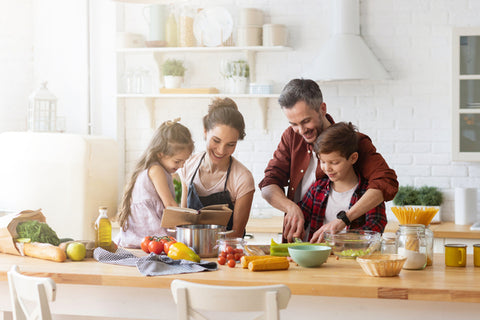The Secret Ingredient
Blog · Nov 02, 2021

We all have to eat. Why not make it a fun family experience? Encouraging your children to work alongside you while you’re cooking has many benefits including an increase in family time and building a healthy relationship to food and nutrition. Let’s face it. There’s not much bonding involved in calling up GrubDash.
Get Excited
Hours in the kitchen preparing a meal is not everyone’s idea of a good time. Figuring out what to cook, doing the grocery shopping, preparing the food, not to mention the clean up afterwards is daunting for most. Who has the time? Enlisting children to help out can turn what may seem like a chore into a fun learning and bonding experience for the whole family.
Start by giving the kids a say in what you’re cooking. It will ease your burden of figuring out what to eat and build excitement for them. Explore recipe books together or browse for new meal ideas online. Then take them along to the grocery store with you. Let them choose the fruits and vegetables. Talk to them about ripeness and freshness and why some produce isn’t always available. They might be surprised to learn that you have to sniff the end of a cantaloupe to tell if it’s ready.
If cooking isn’t your thing, start with an easy recipe that you and your child can make together. Everyone can fill a blender with kefir and fruit for a quick breakfast smoothie or chop vegetables and cube a chicken breast for a savory stir fry.
Nutrition Education
Children are inquisitive, and the questions they will ask while helping in the kitchen naturally open the door for conversations about food and nutrition. If your child asks, “Why are carrots orange?” you can talk about beta-carotene and how the body uses it to enhance vision. If you don’t know the answers to their questions, you can look them up together.
They see first-hand examples of cause and effect when they add too much milk to mashed potatoes and end up with potato soup.
Cognitive Development
Preparing a meal is a great way for children to develop cognitive skills and abilities. Children learn vocabulary when reading recipes and practice math skills while counting and measuring ingredients. Asking children, “What’s next,” helps them learn sequencing and organizational skills.
They see first-hand examples of cause and effect when they add too much milk to mashed potatoes and end up with potato soup. Their problem-solving skills are enhanced when they try figure out how to fix the problem. They learn if they wait the potatoes will absorb the extra milk. No one will need a straw to eat the mashed potatoes after all. Crisis averted!
Physical Development
Cooking tasks like chopping, mixing, squeezing, and spreading develop and strengthen fine motor skills. Younger children can help you mix the dry ingredients, carry small bowls, or flip pancakes, all tasks which develop control and build arm strength.
Older children can chop vegetables for a salad or cut up watermelon for a tasty treat. You’ll appreciate another pair of hands in the kitchen helping you accomplish more in less time.
Emotional Development
The kitchen can be an exciting environment, and cooking has a lot of ups and downs. Presenting a birthday cake they baked and decorated to someone on their special day brings joy and excitement, while the frustration and sadness of facing a burned batch of their favorite cookies will turn that smile upside down.
Cooking requires patience. We have to wait for that homemade pizza to bake, and we have to wait for that cake to cool before we can even think about icing it. Along with patience, cooking teaches delayed gratification and impulse control. If their excitement gets the best of them and they take a bite of the zucchini bread before it cools, they might burn their tongue. Next time, maybe they’ll wait.
Builds Confidence
Entrusting children with responsibility boosts their confidence. When children are successful with smaller tasks, they are more confident to take on more complex assignments. Meringue, anyone?
Following a recipe through from beginning to end shows children they can be successful and the path to success often requires planning and work. It’s a clear reminder that persistence is rewarded with success.
Promotes Bonding and Relationships
Spending time in the kitchen with family strengthens bonds with loved ones. It creates a shared experience which results in a deeper more meaningful experience for everyone involved. Regardless of the outcome, children can exercise their curiosity, ask questions and learn, talk about everything and anything, and have fun and laugh with the family.
Children thrive on accomplishment, and cooking together is an excellent way families can boost that sense of accomplishment. Cooking together inspires children to seek out other ways to try new things and add to their roster of accomplishments. Spending time in the kitchen with your children has the added benefit of cultivating a healthy interest in food that will last a lifetime.